Michelle McLean's Blog, page 30
August 10, 2011
Know Your Audience
I think one of the most important things, if not THE most important thing, for any writer is this:
Know your audience.
When I sit down to write anything, I always have a target audience in mind. If I'm working on a YA novel, I'm thinking of teenagers between the ages of about 14 and 19. When I'm working on children's picture books, I'm usually envisioning my own kids at ages 5 and 7. When I was in school and working on an essay or paper, I had my professor and classmates in mind. And when I wrote Homework Helpers: Essays and Term Papers, I had an audience of frustrated students who had to write a paper in mind.
If you know your audience, you can gear your book or project for them. And I'm not talking about writing for trends or trying to force
your books to be what someone else wants them to be. I'm talking about
knowing who you are writing for. Who is going to be reading your book?
If you know this, you can keep the writing, and the language specifically, appropriate. Now, I'm not talking about swearing or questionable jokes or anything. I mean using the big, field-specific technical language in your papers where your professor will appreciate them and keeping your young adult novels teen-friendly by using the type of language teens use when they speak; using kid-friendly words and terms in picture books; keeping the aliens in their sci-fi worlds and adding the hot and heavy sex scenes to the romance novels, but maybe keeping them out of a NF textbook :D
Can they blend a bit? Sure. I love a little overlap. I love a touch of romance in my sci-fi novels (or any novel really) :D I love a little supernatural in a good mystery. I love a hint of maturity in a cute MG. And maybe a bit of playful youthfulness in an adult novel. It can be hilarious to see an adult talking like a kid or a really smart kid sound more adult than the adults. Nothing is absolute and it certainly doesn't need to be when writing.
But think about it. How popular is your YA novel going to be if you use so many huge, unreadable words that your readers have to run it through a translator just to figure out what you are saying? How popular will your adult spy thriller be if your main character is a bunny named Buttons who solves crimes with his sidekick Terry Turtle? (Although that would be a totally cute PB! Might have to get on that....) What kind of grade are you going to get if you turn in that college-level essay peppered with phrases like "So, dude, like you should totally just listen to me cause I like tooootally get what I'm doing." ?
No matter what you are writing, you've got to keep your audience in mind. I guarantee they'll love you for it :)
Do you keep your audience in mind when you write?
Know your audience.
When I sit down to write anything, I always have a target audience in mind. If I'm working on a YA novel, I'm thinking of teenagers between the ages of about 14 and 19. When I'm working on children's picture books, I'm usually envisioning my own kids at ages 5 and 7. When I was in school and working on an essay or paper, I had my professor and classmates in mind. And when I wrote Homework Helpers: Essays and Term Papers, I had an audience of frustrated students who had to write a paper in mind.
If you know your audience, you can gear your book or project for them. And I'm not talking about writing for trends or trying to force
your books to be what someone else wants them to be. I'm talking about
knowing who you are writing for. Who is going to be reading your book?
If you know this, you can keep the writing, and the language specifically, appropriate. Now, I'm not talking about swearing or questionable jokes or anything. I mean using the big, field-specific technical language in your papers where your professor will appreciate them and keeping your young adult novels teen-friendly by using the type of language teens use when they speak; using kid-friendly words and terms in picture books; keeping the aliens in their sci-fi worlds and adding the hot and heavy sex scenes to the romance novels, but maybe keeping them out of a NF textbook :D
Can they blend a bit? Sure. I love a little overlap. I love a touch of romance in my sci-fi novels (or any novel really) :D I love a little supernatural in a good mystery. I love a hint of maturity in a cute MG. And maybe a bit of playful youthfulness in an adult novel. It can be hilarious to see an adult talking like a kid or a really smart kid sound more adult than the adults. Nothing is absolute and it certainly doesn't need to be when writing.
But think about it. How popular is your YA novel going to be if you use so many huge, unreadable words that your readers have to run it through a translator just to figure out what you are saying? How popular will your adult spy thriller be if your main character is a bunny named Buttons who solves crimes with his sidekick Terry Turtle? (Although that would be a totally cute PB! Might have to get on that....) What kind of grade are you going to get if you turn in that college-level essay peppered with phrases like "So, dude, like you should totally just listen to me cause I like tooootally get what I'm doing." ?
No matter what you are writing, you've got to keep your audience in mind. I guarantee they'll love you for it :)
Do you keep your audience in mind when you write?
Published on August 10, 2011 08:51
August 8, 2011
What's in a Name?
I've been trying to rename a book I wrote a couple years ago. I've been going through it, doing some edits, and one thing it has ALWAYS needed is a really good name. I'm not good with titles in general, at least not my own titles. So this is something that plagues me every time I write something new.
And I know, for me at least, a title really does make a difference. I've chosen to read or not to read books on their title alone. I just finished a book in fact that I bought several months ago (I had a new Nook and the ebook price was cheap) :) but I hadn't really had an interest in reading it because of the title. The description sold me on it, but every time I saw the title in my library, I just passed it by. It has a really bad title that really has nothing to do with the book now that I've read it (and it turned out to be a pretty good story, one that has me wanting to read the many, many other books in the series).
So I'm curious, do you have a hard time naming your books? Do you stress over your titles? And do you ever judge a book by its name?
And I know, for me at least, a title really does make a difference. I've chosen to read or not to read books on their title alone. I just finished a book in fact that I bought several months ago (I had a new Nook and the ebook price was cheap) :) but I hadn't really had an interest in reading it because of the title. The description sold me on it, but every time I saw the title in my library, I just passed it by. It has a really bad title that really has nothing to do with the book now that I've read it (and it turned out to be a pretty good story, one that has me wanting to read the many, many other books in the series).
So I'm curious, do you have a hard time naming your books? Do you stress over your titles? And do you ever judge a book by its name?
Published on August 08, 2011 04:00
August 5, 2011
Friday Funnies - Shark Week Style
The Atheist and the Shark A diver surfaced on Molasses Reef, off Key Largo and is swimming back to his boat when he sees a shark behind him in the water. He starts swimming faster but when he looks back he sees the shark turn and head towards him. He's scared to death, and screems out "Oh God! Save me!" Suddenly time is frozen and a bright light shines down from above. The voice of God says, "Aren't you an atheist? Why do you call upon me when you do not believe in me?" Knowing he can't lie the man replies, "Well, that's true I don't believe in you. But can you make the shark believe in you?" The Lord replies, "As you wish." The light retracts back into the heavens and the atheist looks back to see the jaws of the shark start to close down on him when, all of sudden, the shark stops and pulls back.Shocked, the man believes he has been saved as the huge beast closes its eyes and bows its head and says, "Thank you Lord for this food for which I am about to receive..."
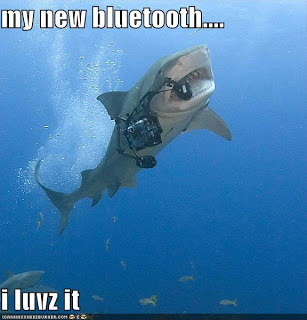 [image error]
[image error]
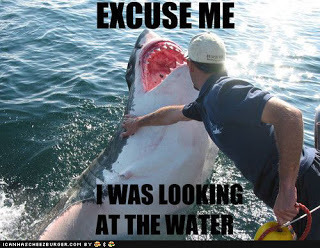 [image error]
[image error]
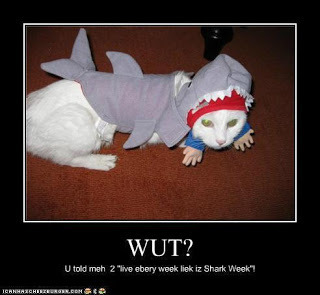 (pics from http://icanhascheezburger.com - joke and cartoons found on floridakeystreasures.com)
(pics from http://icanhascheezburger.com - joke and cartoons found on floridakeystreasures.com)
 [image error]
[image error]
 [image error]
[image error]
 (pics from http://icanhascheezburger.com - joke and cartoons found on floridakeystreasures.com)
(pics from http://icanhascheezburger.com - joke and cartoons found on floridakeystreasures.com)
Published on August 05, 2011 07:23
August 4, 2011
Over on OA Today!
Published on August 04, 2011 12:26
August 3, 2011
The Effect of Writing
Back in January, when my first book was released, I was asked how writing has affected my life, and how my life has affected my writing. In a nut shell…writing has affected everything about my life and my life has affected everything about my writing :)
Like any writer, my experiences, my personality, my relationships, my emotions on any given day…all of these affect my writing. But these things affect non-fiction and fiction differently.Fiction is very much an emotional sport. I sort of have to be in the right mood to write fiction. Because I take all my emotions and past experiences and make them a part of what I am actually writing, all the aspects of my real life that affect me tend to affect my work as well.
But non-fiction is very non-emotional (unless you are talking about creative/narrative non-fiction like a memoir or narrative personal essay). Actually, in my book, Homework Helpers: Essays and Term Papers, I'm trying to calm emotions down. I want to remove the stress and anxiety my readers feel about writing these assignments by making the process as entertaining and easy as possible. Non-fiction, for me, is more analytical, more technical. So, whatever is going on in my life at the moment doesn't really affect my non-fiction writing.
Now, how has writing affected my life? In every way imaginable. In ways I never even dreamed. If I were to make a pro and con list, writing would probably seem like it affected my life negatively. My house is a mess, my kids live on cereal more often than I'd like to admit, I don't spend as much time with them (or with ANYONE for that matter) as I should, I tend to spend all my time in front of my computer instead of out in the world…
But the pros are pretty awesome. Because of my writing, I've met the most wonderful people; I now have an amazing outlet for both the more analytical/educational non-fiction side of me, and the overly imaginative/dreamer fiction side of me; I get to spend my free time doing what I LOVE; I've learned to be patient and persevering and PROUD of who I am and what I do. There is nothing quite like working toward your dream. I've found out just how strong and determined I can be. Writing is helping me develop into the person I always wanted to be. :)
How has writing affected your life? And does your life affect your writing?
Like any writer, my experiences, my personality, my relationships, my emotions on any given day…all of these affect my writing. But these things affect non-fiction and fiction differently.Fiction is very much an emotional sport. I sort of have to be in the right mood to write fiction. Because I take all my emotions and past experiences and make them a part of what I am actually writing, all the aspects of my real life that affect me tend to affect my work as well.
But non-fiction is very non-emotional (unless you are talking about creative/narrative non-fiction like a memoir or narrative personal essay). Actually, in my book, Homework Helpers: Essays and Term Papers, I'm trying to calm emotions down. I want to remove the stress and anxiety my readers feel about writing these assignments by making the process as entertaining and easy as possible. Non-fiction, for me, is more analytical, more technical. So, whatever is going on in my life at the moment doesn't really affect my non-fiction writing.
Now, how has writing affected my life? In every way imaginable. In ways I never even dreamed. If I were to make a pro and con list, writing would probably seem like it affected my life negatively. My house is a mess, my kids live on cereal more often than I'd like to admit, I don't spend as much time with them (or with ANYONE for that matter) as I should, I tend to spend all my time in front of my computer instead of out in the world…
But the pros are pretty awesome. Because of my writing, I've met the most wonderful people; I now have an amazing outlet for both the more analytical/educational non-fiction side of me, and the overly imaginative/dreamer fiction side of me; I get to spend my free time doing what I LOVE; I've learned to be patient and persevering and PROUD of who I am and what I do. There is nothing quite like working toward your dream. I've found out just how strong and determined I can be. Writing is helping me develop into the person I always wanted to be. :)
How has writing affected your life? And does your life affect your writing?
Published on August 03, 2011 06:43
August 1, 2011
Mystery Agent Contest at Operation Awesome!
Head over with your one line pitches! Only the first 50 entries will be taken. Don't pay attention to the comment number - not all of the comments are entries.
Good luck!!!
Good luck!!!
Published on August 01, 2011 06:52
July 29, 2011
Friday Funnies
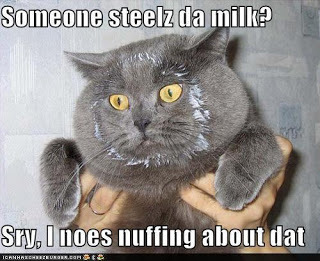
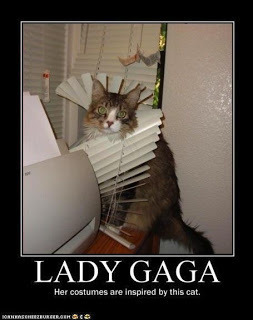
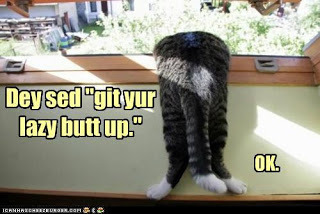 And in honor of the Smurfs moving opening today:
And in honor of the Smurfs moving opening today: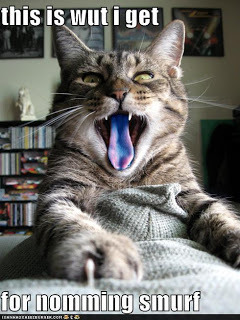 :D Happy Friday!!!
:D Happy Friday!!!And get your one line pitches ready for OA's mystery agent contest on Monday!!
Published on July 29, 2011 07:18
July 28, 2011
Coming Soon - OA Mystery Agent Contest!
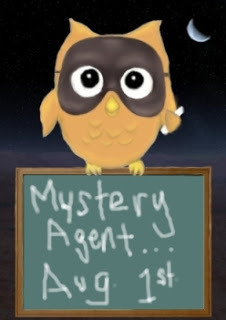 New Mystery Agent contest coming up on Monday over at Operation Awesome! Get your one line pitches ready! Our fabulous new agent is looking for:
New Mystery Agent contest coming up on Monday over at Operation Awesome! Get your one line pitches ready! Our fabulous new agent is looking for:Young Adult fiction, Women's fiction, literary and commercial fiction, and pop-culture non-fiction. She is very interested in acquiring Young Adult (contemporary, sci-fi/fantasy, thriller and horror ), Middle Grade (fantasy, light sf/f, mystery, and contemporary with a hook) commercial women's fiction ( urban fantasy, romantic suspense and romance). Above all, she is looking for anything with an engaging voice, compelling narrative and authentic characters. She is unafraid of debut authors.
So head on over to OA bright and early Monday morning! The first 50 entries will be accepted :)
Published on July 28, 2011 05:05
July 25, 2011
Body Language
One of my weaknesses as a writer is an over-abundance of body language, particularly in dialogue. It's something I am very aware that I do, yet still, I tend to want to tell the reader every single thing my characters are doing as they speak. Stuff like this (as a really bad example):
Jane snorted. "I think you're stupid."
John frowned. "I think you're stupid too."
Jane folded her arms, her brows creased in anger. "You are such a stupid head."
"Oh yeah," John said, stepping closer, "well you're an even bigger stupid head."
"I can't believe I gave you my pudding cup!" Jane said, stomping her foot.
John laughed and winked his eye. "Well you can't have it back now," he said, sticking out his tongue.
Adding all that body language in with the dialogue really isn't necessary. It slows down the pace and the energy of the dialogue. Pick up a favorite book. Flip to a passage of dialogue. There is probably very minimal body language. Without all the body language, the reader is allowed to choreograph the scene for themselves, with the characters' words as their guide. There really is no need for all the extra stage directions :) Something that I tend to forget.
My first drafts are chock full of body language and it's something I spend a lot of time, and several passes, weeding out. Though...I think I'm getting a little better at reigning it in the first time around LOL
How do you feel about body language? Do you add a lot into your dialogue? When reading, do you like knowing every move the characters are making, or do you like supplying that on your own?
Jane snorted. "I think you're stupid."
John frowned. "I think you're stupid too."
Jane folded her arms, her brows creased in anger. "You are such a stupid head."
"Oh yeah," John said, stepping closer, "well you're an even bigger stupid head."
"I can't believe I gave you my pudding cup!" Jane said, stomping her foot.
John laughed and winked his eye. "Well you can't have it back now," he said, sticking out his tongue.
Adding all that body language in with the dialogue really isn't necessary. It slows down the pace and the energy of the dialogue. Pick up a favorite book. Flip to a passage of dialogue. There is probably very minimal body language. Without all the body language, the reader is allowed to choreograph the scene for themselves, with the characters' words as their guide. There really is no need for all the extra stage directions :) Something that I tend to forget.
My first drafts are chock full of body language and it's something I spend a lot of time, and several passes, weeding out. Though...I think I'm getting a little better at reigning it in the first time around LOL
How do you feel about body language? Do you add a lot into your dialogue? When reading, do you like knowing every move the characters are making, or do you like supplying that on your own?
Published on July 25, 2011 05:55
July 22, 2011
Harry Potter Friday Funnies
In honor of the last installment coming out, today is all about Harry Potter :D

Harry Potter and the Chamber of Secrets
Ron: Can you believe our luck? Of all the trees we could've hit, he had to get one that hits back.
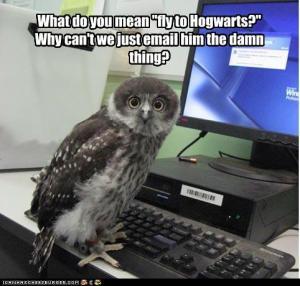
Harry Potter and the Deathly Hallows
Fred: He can run faster than Severus Snape confronted with shampoo.
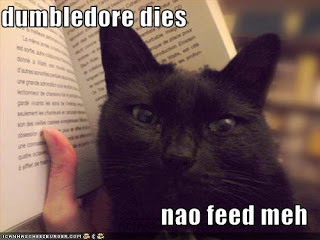
Harry Potter and the Sorcerer's/Philosopher's Stone
"And what if I wave my wand and nothing happens?"
"Throw it away and punch him in the nose," suggested Ron.
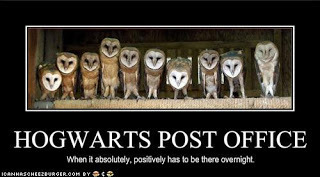
Harry Potter and the Sorcerer's/Philosopher's Stone
Speaking quietly so that no one else would hear, Harry told the other two about Snape's sudden, sinister desire to be a Quidditch referee."Don't play," said Hermione at once.
"Say you're ill," said Ron.
"Pretend to break your leg," Hermione suggested.
"Really break your leg," said Ron.

Harry Potter and the Chamber of Secrets
Ron: Can you believe our luck? Of all the trees we could've hit, he had to get one that hits back.

Harry Potter and the Deathly Hallows
Fred: He can run faster than Severus Snape confronted with shampoo.

Harry Potter and the Sorcerer's/Philosopher's Stone
"And what if I wave my wand and nothing happens?"
"Throw it away and punch him in the nose," suggested Ron.

Harry Potter and the Sorcerer's/Philosopher's Stone
Speaking quietly so that no one else would hear, Harry told the other two about Snape's sudden, sinister desire to be a Quidditch referee."Don't play," said Hermione at once.
"Say you're ill," said Ron.
"Pretend to break your leg," Hermione suggested.
"Really break your leg," said Ron.
Published on July 22, 2011 06:15



